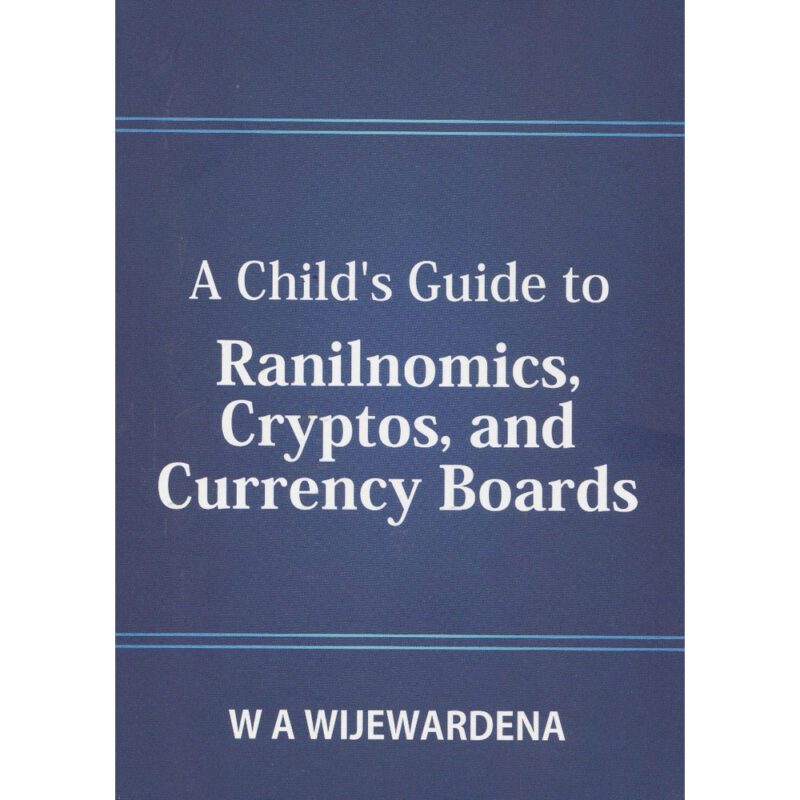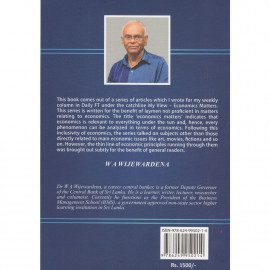This book comes out of a series of articles which I wrote for my weekly column in Daily FT under the catchline My View-Economics Matters. This series is written for the benefit of laymen not proficient in matters relating to economics. The title ‘economics matters’ indicates that economics is relevant to everything under the sun and, hence, every phenomenon can be analyzed in terms of economics. Following this inclusivity of economics, the series talked on subjects other than those directly related to main economic issues like art, movies, fictions, and so on. However, the thin line of economic principles running through them was brought out subtly for the benefit of general readers.
A Child’s Guide to Ranilnomics, Cryptos, and Currency Boards by W.A. Wijewardena
Original price was: Rs. 1,600.00.Rs. 1,500.00Current price is: Rs. 1,500.00.
Buy it now















Ruchira Kitsiri –
A good read for anyone who wants to understand the basic principles related to Sri Lanka’s current economic crisis. It consists, as mentioned in its title, of three parts: Ranilnomics, Cryptos and Currency Boards, in that order.
In part one, Ranilnomics, the author writes that the economic doctrine adapted by the President Ranil Wickremasinghe, in his efforts to recover the country from banckruptcy, namely Social Market Economic policy, differs from Neoliberal Capitalism, as well as the nationalistic anticolonial economic values of the majority of the members of the government he inherited, when he took over the leadership role of the country following the ousting of his predecessor, that are neither Neoliberal Capitalist nor Social Market Economics, making it challenging for him to implement his policies.
However Dr. Jayawerdana fails to describe in detail what these exact differences are, that he has successfully addressed elsewhere, in his weekly blog posts, to popular local online news media. If done in the book too, it would have made this section more informative.
He then goes on to describe what additional measures Ranil could take, to make his policies work better for the situation the country is in, what could have been then dubbed as Ranilnomics, but implies that he falls short of taking them.
Therefore I agree with the good Emeritus Professor of Economics at Crawford School of Public Policy, Australian National University, Premachandra Athukorala who has written the Foreward to Dr. Jayawardena’s book, when he states that the caption ‘Ranilnomics’ is somewhat deceptive.
What the author describes instead are measures that could have been dubbed ‘Ranilnomics’ if Ranil were to adapt and implement them.
The second part, ‘Cryptos’, does a fair job of introducing the emergence of privately issued digital currencies, their pros and cons, their growing popularity, the subsequent involvement of governments in issuing sovereign cryptos, the need to regulate the same and their increasing relevance and possible place in modern day transactions.
This section I feel could have been benefitted if the author also described how cryptocurrencies are mined, a little bit more in detail, the technological and technical aspects of cryptocurrency mining and usage, as most of us are still unfamiliar with this new mode of currency.
The third section, ‘Currency Boards’, by far is in my opinion, is the most important as it makes two interesting revelations.
The first being that it was none other than J. R. Jayawardena (JRJ) that first proposed Nationalist, Socialist and closed economics, protectionist policies, where the government regulates most aspects of the economy, when he was a Finance Minister, long before his ascension to the Executive Presidency. Yet many today accuse Prime Minister Sirimavo Bandaranayake for adapting Socialist policies that they believe was a complete disaster.
The second being the establishment of the Central Bank, abandoning the Currency Board that was established by the British prior to independence.
A measure that paved way for the successive governments to rely on Central Bank’s ability to indiscriminately finance the deficits of their budgets, as they lacked the strict discipline that the Currency Board usually had, when it comes to issuing currency. A feature of independent Central Banks that the ill disciplined short sighted policy makers maximally exploited for the long term detriment of the country, leaving the reader with the impression, some food for thought – that perhaps contrary to the popular belief it is this JRJ’s decision to implement a Central Bank and reliance of its financialising capabilities to work the economy by funding governments’ large budget deficits, without focusing on real economic growth, that may be at the center of the economic crisis that the country has befallen to.
Today Ranil preaches that we should learn to live within our means, but it looks like it was none other than his uncle that adapted economic policies and practices to the contrary.
All this is and more are explained in a Question and Answer format between a young student of Economics and an elder, an Economics Guru, making it easier for the average reader to follow and comprehend.
Ruchira Kitsiri –
Like most things I have written online lately, the above review of mine too, was written in a hurry, using my Samsung Galaxy mobile phone.
I have made a basic mistake of referring to the author of the book as Dr. Jayawardena, when in fact the good author’s correct name is Dr. W. A. Wijewardena.
Hope this note would serve as a suncere apology to Dr. Wijewardena and his readers alike for the inadvertent mistake made.
I wanted to read some of his other work too, on the subject of economics, but everyday chores of living in this beautiful island we call home, interfered in unexpected ways.
Nevertheless, thank you – I am better informed because of his writings.
R.